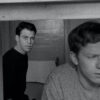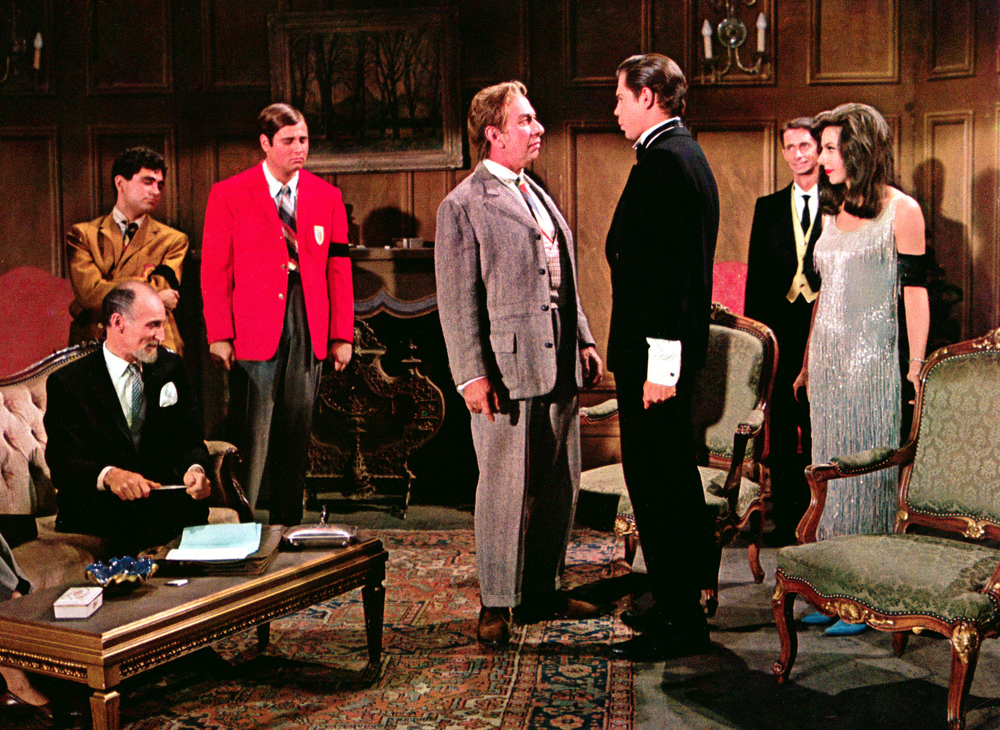This week, we reflect on the most interesting conversations about film we heard in 2014. We start with Carl Reiner talking about getting his start in the film industry in between a screening of his first two features “Enter Laughing” and “The Comic” at Santa Monica’s Aero Theatre on September 20th.
Ever the consummate entertainer, Carl Reiner wasn’t going to let glitch in timing prevent him from keeping a captive audience in stitches. Holding court at the head of the Aero Theatre in Santa Monica on the occasion of a weeklong tribute to his work as a film director, the comedy legend who got his start in television on Sid Caesar’s “Show of Shows” and “The Dick Van Dyke Show” had finished up a book signing of his latest autobiographical tome, “I Just Remembered!” well before the start of a screening of his first two features “Enter Laughing” and “The Comic” and moderator Larry Karaszewski had yet to join him on stage, so he simply started to offer fond recollections of the latter, much as he did at a 2012 New Beverly event, as people continued to file into the theater. By the time Karaszewski, one of the Aero’s favored interlocutors and co-writer of such films as “Big Eyes,” finally came up to start asking him about “The Comic,” which he called one of his favorite films, Reiner had already moved on.
“In Vaudeville, you don’t follow a comic with a comic, so I’d like to sing a little Irish tune,” said Reiner, who remains as feisty as ever at 92.
That’s how Reiner’s last words before “The Comic” began to roll weren’t about the film we were about to see, but rather a faithful rendition of “That Tumbledown Shack in Athlone,” inspired by his memories of telling his father at six that he wanted to be an Irish tenor when he grew up after listening to a radio program put on by one of his pops’ friends on Saturdays. As he recalled, “My father said to me, ‘Well, you can’t be an Irish tenor, but you can be a Jewish tenor singing Irish songs.’”
Thankfully, that pursuit ended then and there, but Reiner’s deep dive into his past set the tone for the evening, in which he covered a lot of ground and even fit in a little crooning of “Pagliacci” at the end. Having recently watched Ken Burns’ documentary “The Roosevelts” on PBS, Reiner was moved to speak about how he was a machinist delivering sewing machines to hatmakers in New York when his brother told him about the Works Progress Administration’s arts programs.
“When I was 17 years old, my brother saw a little ad in the paper, it said, “WPA – Free Acting Classes. 100 Centre St. New York,” said Reiner, who noted that the extent of his acting experience was a role in his third grade play “Six Who Passed While Lentils Boiled,” and that he would marry his wife Estelle in the very same building. “If it wasn’t for Franklin Roosevelt and the WPA Project, I would not be where I am today.”
He said the same about his wife, whose approval when he tried his hand at writing led to the genesis of “Enter Laughing,” the semi-autobiographical novel that was inspired by his start in show business.
“During the war, I was a teletype operator and when I got home, I wondered if I could still type,” said Reiner. “So I typed up a short story, showed it to my wife and she said, where’d you get this? And I said, I wrote it. She said, “You wrote this?” She said, ‘It’s good.’ I went downstairs and wrote 13 little stories like this.”
Reiner passed those stories onto a friend of a friend at a party who was introduced as someone who worked in “Pocket Books,” leading him to believe that he lined wallets, but soon discovered he actually worked at the publishing arm of Simon and Schuster. After clearing up the confusion, Reiner was asked if he could expand his writing to novel length because it was more sellable.
“I came home and I said to my wife, ‘The guy wants me to write a novel,” said Reiner. “And I said, ‘I don’t have enough words to write a novel. My wife in her infinite wisdom said the line that made it — ‘Darling, you may not have the words, but you have the feeling.’”
Given that push, Reiner naturally was drawn to his earliest days as an actor as a subject, recalling when he performed six times a week “off-off-Broadway” in a show called “The Bishop Misbehaves.” As it turned out, the experience of the play itself wasn’t what was most resonant in his mind to dramatize, but rather the behind the scenes machinations, including the one that led to his discovery when after the backstage, including its bathroom, was closed after a performance.
Reiner reminisced, “I went to the toilet in front [of the theater] – you weren’t not supposed to mingle with the audience — and I was in a stall and the guy next to me said, ‘You were very good in the play. Would you like to come to a summer theater?’ That was the aim of every young kid was to come to a summer theater. Two days later, I’m on a bus going to the Rochester Summer Theater and that was the beginning of my career.”
Not only did the experience lead to a long creative life for Reiner, but as a story, “Enter Laughing” has had a considerably long tail. The tale that emerged, of a young man whose parents dream of a career for him in pharmaceuticals while he toils away in a stage production that always seems just moments away from disaster, spawned not one stage version, but two as both a play and a musical, the latter being revived this year at the Wallis Annenberg Performing Arts Center in Beverly Hills. (Despite this, the film version is rarely screened and unavailable on DVD, though it features a rare acting turn from Elaine May as a needy actress, the first featured turn from Reni Santoni as Reiner’s surrogate and Shelley Winters as his overly concerned mother.) Reiner actually had no plans to pursue it further after finishing the novel, handing off the play adaptation to “Fiddler on the Roof” playwright Joseph Stein, but then when the play was successful and a film version beckoned, he decided to make it his directorial debut.
“I hadn’t directed before, but I had written two movies — ‘The Thrill of It All” and “The Art of Love,” and [“The Art of Love”] was okay, but I noticed in the direction, there was some kind of places where…and comedians know this, you have a good joke and two guys are playing together, you don’t cut to the joke,” said Reiner. “When I saw it, they cut to the joke, [so] I became a director to protect my material and then I found out I knew how to direct. You learn how to direct by hiring the best actors and say, ‘Go do it.’ Steve Martin – four movies, I never told him a thing.”
Although Reiner was being modest, Karaszewski interjected that it was because of him that he learned you could make a career out of writing, watching Reiner’s “The Dick Van Dyke Show” and realizing, “Rob Petrie was a nice guy and he had a beautiful wife and a house in New Rochelle, and he got all that by writing jokes?” Reiner admitted, it’s hardly the first time he’s been told that.
“Conan O’Brien said the same thing a couple of days ago,” said Reiner. “Young people come up to me and it happened 20 years ago and it’s happening now that there’s reruns. These are kids who were funny when they’re 12, 13, 14 years old, but they had no idea of being comedians and they said they’re never going to be able to use their funniness. They didn’t know there was a thing called a writer. They thought all comedians made it up.”
He continued, “I take credit for the fact that [‘The Dick Van Dyke Show’] had a viability because I assiduously said to myself and every writer that came through, ‘no slang.’ This is a show that may last if we don’t use words like ‘gat’ for gun or ‘splitsville’ or any of the slang of the day. We use English, the language that Shakespeare used.’”
Still, Reiner insisted that the real secret of his success was that he wrote what he knew, which all began with “Enter Laughing” and has done in all of his work since.
“When I started writing, the first thing I ever wrote, I said, well, it could be a doctor, but as a doctor, I’d have to learn this or that — a mammogram or an exoskeleton — and I said, why don’t I write about something I know about?” said Reiner. “I stayed close to show business and I wrote about myself. It’s all autobiographical, just changing the names and the women.”




